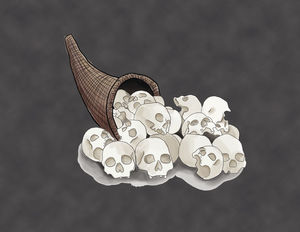Americans must acknowledge Thanksgiving’s racist origin

Megan Calvin
November 16, 2016
This is an opinion article and does not necessarily reflect the views of The Tulane Hullabaloo.
For college students especially, American Thanksgiving might be one of the best holidays of the year. Free food and childhood nostalgia can easily eclipse its dirty origin story. In truth, Thanksgiving has racist roots that are widely ignored by the American public. The glorification of colonialism and stereotyping of Native Americans should make anyone, regardless of race, pause and consider the cultural racism that has been a part of our childhood socialization.
In simplest terms, the Thanksgiving origin story forgives pilgrims — and all Americans—for their crimes against Native Americans. It paints a rosy picture of harmony and coexistence between the two groups, though at the time, colonists were stealing land and committing genocide. Even more, there is no evidence that the Thanksgiving story, as we imagine it, actually happened.
“This day forth shall be a day of celebration and thanksgiving for subduing the Pequots,” John Winthrop, governor of Massachusetts at the time, proclaimed following the massacre of approximately 700 Native Americans.
This idealism is typical for colonialism, which is defined by Merriam-Webster as the policy or practice of control by one power over another nation, often including settling and economically exploiting it. American settlers pursued colonialism on behalf of various European powers, using the area and its people for material gain. The land and the people already living there were seen only as resources to be used for the betterment of the settlers’ home countries.
The story of Thanksgiving treats this exploitation as an equal-opportunity agreement between the two groups. Native Americans and white settlers could trade and both end up on top. Historically, this did not happen. But now, as American children grow up and learn about Thanksgiving in school or from families, peaceful coexistence is the first image that comes to mind when they think about Native Americans. As they grow up, they will learn — in extremely white-washed terms — about the conflicts between settlers and Native Americans, but their first experience with Native Americans will always be the Thanksgiving feast.
This imagery is propaganda with long-reaching effects. It glorifies colonialism, which still has global consequences. It implicitly excuses racism, especially towards Native Americans, by erasing centuries of violence and marginalization. It gives white people the idea that they can wear native headdresses as a holiday costume or in other situations.
This discussion is not a call to end Thanksgiving, which would be impossible for a holiday so rooted in American culture. Instead, we need to open up dialogue with our family members and educate our children about the major problems with blindly celebrating the holiday. There have also been some movements to rename the holiday “Immigrants Day,” which is much more accurate than its current constructed, political mythology.
Kathryne LeBell is a student at Newcomb-Tulane College and can be reached at [email protected]









Leave a Comment